|
|
|
Sort Order |
|
|
|
Items / Page
|
|
|
|
|
|
|
| Srl | Item |
| 1 |
ID:
184131
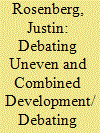

|
|
|
|
|
| Summary/Abstract |
This forum arises from an online event on the theory of uneven and combined development (UCD). Following an introduction which proposes a ‘special affinity’ between UCD and International Relations (IR), four presenters at that event discuss their ‘view from outside’ UCD, including perspectives from Global Historical Sociology, Realism, Decolonial theory and Gramscian Marxism. Meanwhile four members of the audience add their views on UCD and disciplinarity, the need for pluralism in UCD methodology, UCD and ‘whiteness’, and its potential contribution to ecological theory and practice.
|
|
|
|
|
|
|
|
|
|
|
|
|
|
|
|
| 2 |
ID:
084020
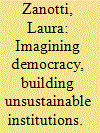

|
|
|
|
|
| Publication |
2008.
|
| Summary/Abstract |
This article employs theoretical tools devised by Michel Foucault to explore the political rationale, technologies of government, and unintended consequences of UN efforts at statebuilding and democratization in the context of the peacekeeping operation in Haiti. It aims to offer an empirically oriented contribution to the study of the modalities of international intervention in the post-Cold War period and the effects of transplanting institutional models. The article shows that the UN's political imaginary can be traced back to the texts that guided the reform of punishment institutions in Classical Europe. The United Nations saw its effort at statebuilding as centered upon making local institutions disciplined, visible, and centralized. The failure of the UN to achieve its stated goals is appraised in the contingent modalities of the encounter between an ethnocentric political imaginary that takes for granted that modalities of government can be transplanted with benign effects and local conditions of extreme poverty. The article concludes that, while purporting to build an independent, democratic, and well-functioning state, unreflectively imported political models foster disorder and dependence. They also reinforce the instruments of control and conditionality in the hands of international actors, thus fostering the carceralization of international spaces.
|
|
|
|
|
|
|
|
|
|
|
|
|
|
|
|
| 3 |
ID:
141205
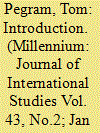

|
|
|
|
|
| Summary/Abstract |
Global governance is in flux. Scholarship on the practice of global governance has reimagined it as a realm of disputes and confrontation, rather than one of interest-alignment within multilateral interstate forums. A profound sense of governance deficit is provoking critical reflection both within the corridors of power and among practitioners and scholars. A call within academic circles for renewed reflection on global governance as a practice-oriented scholarship has elicited varied responses from the international relation (IR) fraternity. In taking stock of the state of the art of ‘global governance theory’, a number of scholars have advocated for its revival to be grounded in the kind of critical reflection often absent from mainstream IR discussion. Others contest any meaningful demarcation between IR and global governance scholarship. This forum responds to a number of converging developments. Situating contributions broadly within the notion of an interregnum, it is a first cut towards a more innovative global governance research and practice-oriented agenda. We focus, in particular, on reframing the problematique of global governance from one dominated by multilateral interstate geopolitics, towards a critical reappraisal of both structure and political economy in light of the evident complexity of global governance systems.
|
|
|
|
|
|
|
|
|
|
|
|
|
|
|
|
| 4 |
ID:
152339
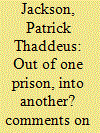

|
|
|
|
|
| Summary/Abstract |
This intervention, while highlighting points of agreement with Rosenberg’s arguments, also challenges Rosenberg’s characterization of the discipline. Specifically, this short intervention takes issue with the image of the field as International Relations as a discipline and multiplicity as its proposed core notion.
|
|
|
|
|
|
|
|
|
|
|
|
|
|
|
|
| 5 |
ID:
140112
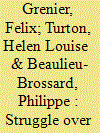

|
|
|
|
|
| Summary/Abstract |
Since the inception of International Relations (IR) within university departments, its disciplinary status has been the subject of constant debate. Yet, the current literature on ‘the state of the discipline’ silences this debate either through IR’s assumed disciplinarity or conflation of debates about theory with the existence of IR. This Forum moves beyond this literature by explicitly engaging whether IR is a discipline or not and by enquiring how this status matters. Contributors rely on the sociology and philosophy of social science to call into question or affirm the disciplinarity of IR to argue whether IR is as a subfield of Political Science, a full-blown and autonomous discipline, or a hybrid field of interdisciplinary studies. Furthermore, contributors reveal the implications of the different disciplinary statuses regarding the academic institution, interdisciplinary possibilities and modes of organizing IR. Overall, these contributions aim to engage rather than close the disciplinary debate, creating further space for reflection.
|
|
|
|
|
|
|
|
|
|
|
|
|
|
|
|
|
|
|
|
|